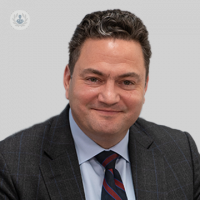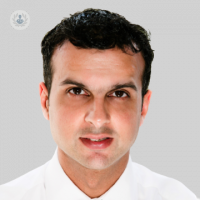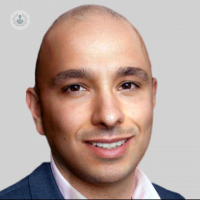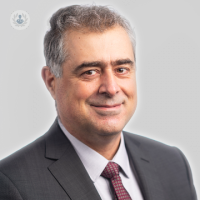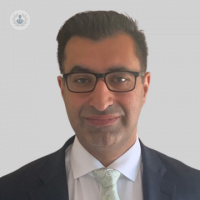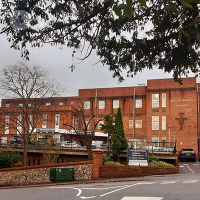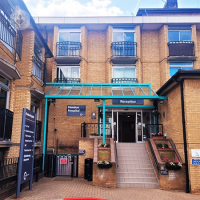What are tendon injuries?
Tendon injuries, also known as tendinopathies, happen when there is an overload that causes small fibres to tear. When the affected muscles or joints are put under pressure, it causes tendon inflammation which reduces blood flow and can lead to nerve compression. When there is a mild inflammation it is referred to as tendonitis. It is called tendinosis if there is tendon degeneration.

Tendon injuries are common in sports. Injury location will depend on the sport. Some common tendon injuries include:
- Achilles tendon: in the heel, it is common among professional athletes. It causes inflammation, pain, and swelling.
- Patellar tendon: in the knee, it is more common in women. Exercising is important to avoid discomfort.
- Supraspinatus tendon: in the shoulder, as it is a fragile area, and recovery tends to take longer. This is usually the tendon affected in rotator cuff injuries.
- Lateral epicondyle tendon: in the elbow, most commonly known as tennis elbow. It is common amongst tennis players, but can happen in other professions too.
Prognosis
Tendon injuries do not tend to be a serious condition, providing adequate treatment is given.
Tendon injuries may be:
- Acute: less than two weeks
- Subacute: between three to six weeks
- Chronic: more than six weeks
What are the symptoms?
The symptoms of tendon injuries vary according to their location. There are several common symptoms, including:
- Pain and tenderness when moving the tendon or joint
- Stiffness at night or upon waking
- Inflammation
- Heat and redness
- Hearing or feeling a crack when moving the tendon
- Thickening of the tendon (in some cases)
Medical tests
A physical examination is normally enough to identify the affected tendon and the seriousness of the injury. However, in some cases, the specialist may carry out other tests to have a closer look, which may be an ultrasound or an MRI scan.
What causes tendon injuries?
Some of the most common causes include:
- Not warming up before exercise
- Sports injuries
- Repetitive movements or overexertion
- Physical changes (such as postural dysfunction and many more)
- A bad movement, especially when exercising
- Inadequate training equipment
- Metabolic dysfunctions or poor hydration
How can tendon injuries be prevented?
There are different tips that can be followed to avoid this kind of injury. It is important to take care when lifting heavy loads to avoid pushing the tendon beyond its limit.
A massage or stretching after lifting a heavy load is one way to prevent a tendon injury.
Other things to bear in mind are:
- Improving sports techniques
- Lessening loads
- Using appropriate footwear
What is the treatment for tendon injuries?
Treatment tends to be conservative, and includes rest and anti-inflammatory measures, depending on the severity of the injury. This may include medications, nutritional supplements, dietary changes, using bandages and manual therapy.
The methods used will depend on the injury location, severity, and how long it has affected the patient. Although there are many different treatments, the most common ones are:
- Rest
- Stretching
- Anti-inflammatories
- Physiotherapy
When treatment doesn’t work, surgery may be resorted to instead.
What specialist should I see?
Tendon injuries are normally treated by a sports medicine specialist, an orthopaedic surgeon or a physiotherapist.
02-05-2013 04-19-2023Tendon injuries
Mr Dean Michael - Orthopaedic surgery
Created on: 02-05-2013
Updated on: 04-19-2023
Edited by: Carlota Pano
What are tendon injuries?
Tendon injuries, also known as tendinopathies, happen when there is an overload that causes small fibres to tear. When the affected muscles or joints are put under pressure, it causes tendon inflammation which reduces blood flow and can lead to nerve compression. When there is a mild inflammation it is referred to as tendonitis. It is called tendinosis if there is tendon degeneration.

Tendon injuries are common in sports. Injury location will depend on the sport. Some common tendon injuries include:
- Achilles tendon: in the heel, it is common among professional athletes. It causes inflammation, pain, and swelling.
- Patellar tendon: in the knee, it is more common in women. Exercising is important to avoid discomfort.
- Supraspinatus tendon: in the shoulder, as it is a fragile area, and recovery tends to take longer. This is usually the tendon affected in rotator cuff injuries.
- Lateral epicondyle tendon: in the elbow, most commonly known as tennis elbow. It is common amongst tennis players, but can happen in other professions too.
Prognosis
Tendon injuries do not tend to be a serious condition, providing adequate treatment is given.
Tendon injuries may be:
- Acute: less than two weeks
- Subacute: between three to six weeks
- Chronic: more than six weeks
What are the symptoms?
The symptoms of tendon injuries vary according to their location. There are several common symptoms, including:
- Pain and tenderness when moving the tendon or joint
- Stiffness at night or upon waking
- Inflammation
- Heat and redness
- Hearing or feeling a crack when moving the tendon
- Thickening of the tendon (in some cases)
Medical tests
A physical examination is normally enough to identify the affected tendon and the seriousness of the injury. However, in some cases, the specialist may carry out other tests to have a closer look, which may be an ultrasound or an MRI scan.
What causes tendon injuries?
Some of the most common causes include:
- Not warming up before exercise
- Sports injuries
- Repetitive movements or overexertion
- Physical changes (such as postural dysfunction and many more)
- A bad movement, especially when exercising
- Inadequate training equipment
- Metabolic dysfunctions or poor hydration
How can tendon injuries be prevented?
There are different tips that can be followed to avoid this kind of injury. It is important to take care when lifting heavy loads to avoid pushing the tendon beyond its limit.
A massage or stretching after lifting a heavy load is one way to prevent a tendon injury.
Other things to bear in mind are:
- Improving sports techniques
- Lessening loads
- Using appropriate footwear
What is the treatment for tendon injuries?
Treatment tends to be conservative, and includes rest and anti-inflammatory measures, depending on the severity of the injury. This may include medications, nutritional supplements, dietary changes, using bandages and manual therapy.
The methods used will depend on the injury location, severity, and how long it has affected the patient. Although there are many different treatments, the most common ones are:
- Rest
- Stretching
- Anti-inflammatories
- Physiotherapy
When treatment doesn’t work, surgery may be resorted to instead.
What specialist should I see?
Tendon injuries are normally treated by a sports medicine specialist, an orthopaedic surgeon or a physiotherapist.


Posterior tibialis tendon dysfunction (PTTD): Symptoms and solutions
By Mr Shelain Patel
2025-02-10
Posterior tibialis tendon dysfunction (PTTD) is a prevalent condition that affects the foot and ankle, characterised by the gradual degeneration, inflammation, or tearing of the posterior tibialis tendon. Here, Mr Shelain Patel, renowned consultant orthopaedic foot and ankle surgeon, offers his expert insight into the intricate facets of PTTD, exploring its symptoms, diagnostic approaches, and a variety of treatment modalities. See more


Common tendonitis recovery questions
By Lucy Macdonald
2025-02-10
Tendonitis, or as it is now more accurately known, ‘tendinopathy,’ is a condition that occurs when a tendon (which is a band of fibrous connective tissue that attaches muscles to bones) becomes painful due to a process that changes the structure, blood supply and innervation of the tendon. Here, Lucy Macdonald, renowned chartered physiotherapist at Octopus Clinic, provides an expert insight into tendonitis recovery. See more


Extensor tendonitis: how does it occur and how is it treated?
By Professor Bal Dhinsa
2025-02-10
Extensor tendons are found at the top of the foot and over the ankle. They are often involved in extending your foot and ankle off the ground. The term tendonitis suggests that this is inflammation of the tendons. However, this is misleading because it is not an agreement yet as to determine if the injury is inflammation or if it is re-generation of the tissue. Re-generation signifies damage to the tissue. See more


Lipogems Q&A with Dr Ralph Rogers, the UK pioneer of Lipogems
By Dr Ralph Rogers
2025-02-10
Learn from Dr Rogers about the benefits of Lipogems, a procedure of fat-assisted healing and an incredible way of relieving joint pain and postponing or avoiding surgery altogether. See more
Experts in Tendon injuries
-
Mr Rohit Madhav
Orthopaedic surgeryExpert in:
- Sports traumatology
- Minimally invasive bunion surgery
- Ankle arthroscopy
- Tendon injuries
- Foot fracture
- Bunion (hallux valgus)
-
Mr Manoj Sood
Orthopaedic surgeryExpert in:
- Hip replacement
- Knee replacement
- Anterior cruciate ligament
- Sports injuries
- Knee cartilage replacement
- Tendon injuries
-
Mr Neil Jain
Orthopaedic surgeryExpert in:
- Knee
- Shoulder
- Sports injuries
- Tendon injuries
- Joint preservation surgery
- Sports surgery
-
Mr Dimitrios Karadaglis
Orthopaedic surgeryExpert in:
- Rotator cuff surgery
- Sports injuries
- Wrist arthroscopy
- Elbow arthroscopy
- Shoulder replacement
- Tendon injuries
-
Professor Bal Dhinsa
Orthopaedic surgeryExpert in:
- Sports injuries
- Tendon injuries
- Arthritis
- Bunion (hallux valgus)
- Minimally invasive bunion surgery
- Morton's neuroma
- See all

Mount Alvernia Hospital - part of Circle Health Group
Mount Alvernia Hospital - part of Circle Health Group
Harvey Road, Guildford GU1 3LX
No existe teléfono en el centro.
By using the telephone number provided by TOP DOCTORS, you automatically agree to let us use your phone number for statistical and commercial purposes. For further information, read our Privacy Policy
Top Doctors

Hendon Hospital - part of Circle Health Group
Hendon Hospital - part of Circle Health Group
46/50 Sunny Gardens Rd, London NW4 1RP
No existe teléfono en el centro.
By using the telephone number provided by TOP DOCTORS, you automatically agree to let us use your phone number for statistical and commercial purposes. For further information, read our Privacy Policy
Top Doctors

The Wilmslow Hospital - part of HCA Healthcare
The Wilmslow Hospital - part of HCA Healthcare
52-54 Alderley Road, Wilmslow, Cheshire, SK9 1NY
No existe teléfono en el centro.
By using the telephone number provided by TOP DOCTORS, you automatically agree to let us use your phone number for statistical and commercial purposes. For further information, read our Privacy Policy
Top Doctors
-
Mount Alvernia Hospital - part of Circle Health Group
Harvey Road, Guildford GU1 3LX, GuildfordExpert in:
- Hip
- Cancer
- Cardiology
- General Surgery
- Orthopaedic surgery
- Orthopaedic spinal surgery
-
Hendon Hospital - part of Circle Health Group
46/50 Sunny Gardens Rd, London NW4 1RP, North LondonExpert in:
- Cardiology
- General Surgery
- Gastroenterology
- Hand and wrist
- Nutrition and Dietetics
- Foot and ankle
-
The Wilmslow Hospital - part of HCA Healthcare
52-54 Alderley Road, Wilmslow, Cheshire, SK9 1NY, WilmslowExpert in:
- Breast Cancer
- Men's health check
- Orthopaedic surgery
- Obstetrics and Gynaecology
- Women’s health
- Sports Medicine
- See all
- Most viewed diseases, medical tests, and treatments
- Baker's cyst
- Osteoporosis
- Chronic headache
- Ulnar nerve entrapment
- Peripheral nerve block
- Peripheral neuropathy
- Facial feminisation surgery
- Migraine
- Joint pain
- Lumbar herniated disc
